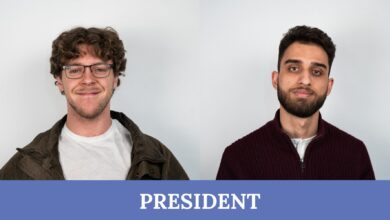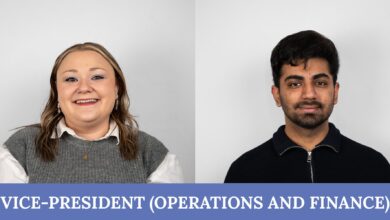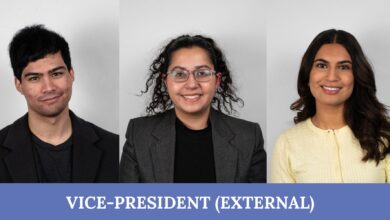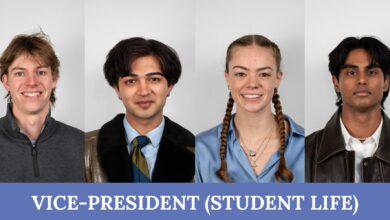SU Elections Q&A: Vice-President (External)
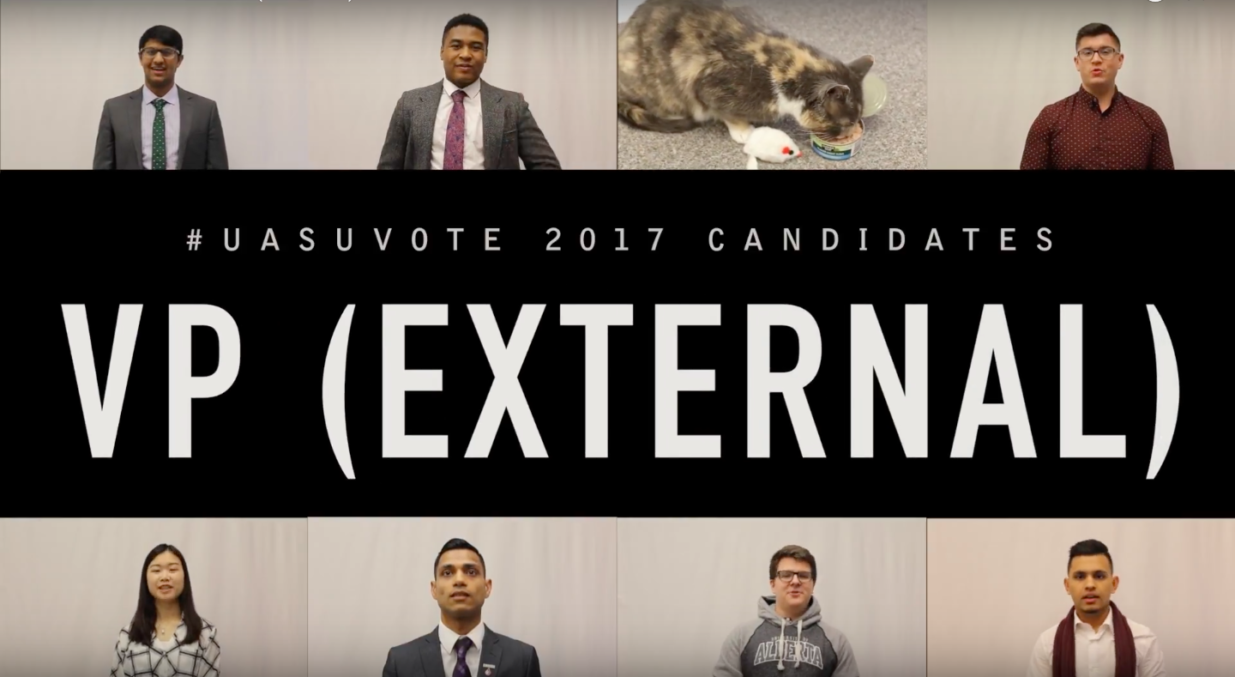 Oumar Salifou
Oumar SalifouThe Students’ Union Vice-President (External) is a role that’s mainly focused on external advocacy, which means a lot of meetings with representatives of federal, provincial, and municipal governments — including sitting down with MPs and MLAs. They also work with a number of student advocacy bodies, including the Council of Alberta University Students (CAUS) and the Canadian Alliance of Student Associations (CASA).
The following interviews have been condensed and simplified for clarity. Full recordings can be heard on SoundCloud.
Reed Larsen
Ankur Pandey
James Thibaudeau
Lisa Zhang
Why are you running?
Reed Larsen: I have spent the last year on Students’ Council. I have worked quite a bit and on top of that I have enjoyed my time. I have reviewed policies while on Council’s policy committee. I have had a good time writing bylaws or looking over audit finances. Going from there, I am running again this year. Last year I was really big on engagement by trying to get people more involved. This year I had a realization that it does not work that way — it is a long term thing. Over this year I thought about building opportunities for people to be involved. Ultimately, I am running because people have said that I would be good for the job. I think this campaign is a continuation of this year’s work.
Ankur Pandey: I would like to bring positive change for the students of the University of Alberta and as well within the Students’ Union. As VP (External), I will be taking students’ concerns to the respective external ministry depending on what we are dealing with. For example, if it is something with the city, I will reach out to the City of Edmonton. If it is tuition fees, I will reach out to the provincial government. If it is student loans, I will reach out to the Government of Canada.
James Thibaudeau: I am running because I was involved with the Faculty of Education’s faculty association. I was the VP (External) there and I realized there that, even in such a short amount of time, I was able to make a huge difference in our student lives. I felt great doing it and I would love to bring that experience to main campus and Students’ Union.
Lisa Zhang: I believe that as an undergraduate student, I find that volunteering and gaining skills has led me to realize the importance of giving back to our school community and get more people involved. I find as a VP (External), the role will give me the opportunity to actually improve student policies by working with the Council of Alberta University Students, and really tackle some of the important concerns that the students have. I want to see myself grow as a human and strengthen my skills.
Can you briefly explain your platform?
Larsen: There is no such thing as a brief platform! I want to talk about tuition. Regulating folks’ tuition will be under there. Also I want to focus on mandatory non-instructional fees, international students, and Consumer Price Index (CPI) versus Academic Price Index (API) inflation rates. Finally, I want to look at granting and funding terms. Reductions in tuition should be expanded. I want people to understand that if we ask for reductions in tuition we really need backfill funding from the government. We need multi-year approaches; more than just a one-year outlook. Next, I want to centre in on housing. Right now, residents of the University of Alberta do not have tenants’ rights, the rights that other Albertans have if they rent elsewhere. I think it’s important to develop specific legislation to cover their rights, make sure they get deposits back, and have an arbitration process. I want to educate students and make sure that when people come to live here on campus or in Edmonton for the first time that they understand the rental procedures. So many students lose their deposits because they don’t know they have service rights. Finally, there is housing development. This will include opening up a conversation with the City of Edmonton — for example, if the city is developing infill housing can we make sure these areas remain rental driven, high density, and work for students? The last area of focus is employment. I want to ensure the Summer Temporary Employment Program (STEP), a subsidized summer work program, works for students year-round. I think the people who need money and support need it all year and end up working part-time year round. International students’ work hours are also important, as they are expected to pay much more than average students so they should have the opportunity to work to cover those costs. Right now they are limited to 20 hours a week. Increasing this to 30, or even full-time 40 hours a week, would be better. You can learn more about it at reedforvp.ca, you can read it there and download it with cited sources.
Pandey: My platform will be based on three major concerns. The first is looking into a tuition freeze for all students including international students which was sadly unsuccessful last year. Secondly, I would look at getting easier access to student loans. I have read the policy and it sounds harsh; I would like them to be more lenient to get easier access for student loans. Thirdly, I would like to bring more job fairs to campus for students to get experience. They would be able to see professionals and get to know what they would be getting asked by interviewers so they can see the process, get familiar with it, and succeed in the future.
Thibaudeau: My platform is based on equity and justice. I want to make sure students are not left behind. I want to ensure their voices are heard and that they get accessibility. Whether that is in funding, access to mental health care, or any other issue that comes up. I hope that students would be able to come to me and I would be able to solve their issues so that they would not have any barriers in accessing anything they would need on campus.
Zhang: The first platform point is mental health resources. I want to focus on improving what we have right now, like the Peer Support Centre — there is not that much drop in hours. Another big issue is there’s no strict guideline to tell students, “Oh you need to go see a councillor,” versus, “Oh you just need to talk to someone,” and go to Peer Support Centre. My second platform point would be student employment, to have better year-long internship programs for students. My ideal was to have it at the beginning for first-year students to figure out what they want to do and have workshops for employers to build connections with students. I would also like start a website for students to build profiles including volunteering activity. Employers will have a profile of themselves and then they can look at student profiles and find employment that way instead of posting job descriptions on the career centre website. The third one I have was with non-instructional fees — I realized lately they have been increasing over the past couple of years. I would like to increase transparency and look into options of opting out, and creating regulations involving lobbying to our government to ensure we have stricter regulations for non-instructional fees. Not just, you know, tuition in a different name.
This year’s VP (External) facilitated EmpFest. Would you organize this again? Why or why not?
Larsen: I personally would not be the one to organize it. I believe that EmpFest is a great start and build up. I do believe VP (External) Mike Sandare did a great job developing the festival. However, going forward it is an internal event. It would be hosted by the Students’ Union. That would be something that I would see the other people I would work with be more interested in it. It might be a conversation with the Vice-President (Student Life). I would then fulfill my External role to make sure those connections with business, government, or any employer actually worked. We are still waiting for the report on EmpFest to see how successful it was or how much money we got for our bang. That might be out actually halfway through the campaign. I would wait for those resources to make a final judgment.
Pandey: I kind of like what was done. Although, my goal would be to bring professionals to campus to their related faculties. I would like to bring more doctors to the Faculty of Medicine, nurses to the Faculty of Nursing, lawyers to the Faculty of Law, and law enforcement or probation officers to the Faculty of Arts. Maybe students do not have the opportunity to attend EmpFest which happens once. If I bring the same people over it would be more flexible for students. I am a correctional peace officer, working for Alberta Justice and Solicitor General, I will be using my experience to help students.
Thibaudeau: Absolutely, I would organize this again. I feel that student employability is a huge issue. I am often shocked by the amount of people that go through their four-year undergraduate degree, end up thousands of dollars in debt, and have to take a job as a waiter somewhere or in retail when they cannot get into the field they want. I felt that EmpFest was a great opportunity to start building a resume and start understanding what students need to do while in school to be able to increase their employability after school.
Zhang: I would do something a little bit different because I do see knowing how to dress professionally and bringing in professionals to talk about those, it would be similar to my job shadow website. I find having such a week-long event will might not be able to benefit students because due to the schedule of students, depending on how your schedule works out. If I do get elected as a VP (External), I would move for my student employment where I be able to better hear what student actually want. Let’s say if they want a year-long internship to actually shadow a professional. I would like to improve that and then I would just have different events. I know that right now we have reading week, but maybe before reading week because I know most midterms are at the week prior to the reading week — maybe I’ll have it towards the end of reading week, but before reading week, like the Friday or something like that, that works for most students.
If you were sitting down in a meeting with the Minister of Advanced Education, and he said that international undergraduate tuition would be rising by 10 per cent next academic year, how would you try to negotiate this number down?
Larsen: If I were to hear this from the Minister himself and not from the Board of Governors, the best way to bring that number down would be probably to show protest. If it were to come from the Board of Governors we could try to negotiate with the university. At the government level, we would basically have to remind them that a three per cent increase, a few hundred dollars, saw a massive increase in international students who just could not afford food. Raising international students’ tuition flat out 10 per cent right now will basically see some people leave this country by tomorrow. My immediate thought would be is there a way to grandfather this? We cannot throw this on those international students who are in their third year and working full-time to pay their tuition because they legit might just leave. Can we find a way to limit this just to new incoming international students? That way they understand the costs when they come in. After that it would be organizing shows of support saying that this would be too much. We would need to have the International Students’ Association come out and give reasons why this would be too much.
Pandey: That is a really good question. I am an international student. Rising international student fees are probably going to decrease the number of students enrolled in the university from abroad. I would like to convince the Minister that we would lose international students who would go to another university. I would want a tuition freeze for international students as well so that we can keep them at our university.
Thibaudeau: I would be talking to the Minister of Advanced Education and try to show him that this is an unfair rise, particularly that we are in a tuition freeze. International students face a lot of barriers coming to our university. If they are faced with more and more fees, as they have in the past few years with a rise coming next year of three per cent, you are going to lose a lot of valuable students. You are going to end up devaluing the education we have here by not having the best and the brightest. This will be because we are artificially putting barriers in front of them.
Zhang: I think the first thing that I would do is talk the organizations we have connections to, let’s say the Alberta Students’ Executive Council or CAUS to come up with a plan, because there has been a lot in increasing international student tuition already. Our tuition has been frozen, but international student tuition continues to rise. I think the 10 per cent would be unfair to international students. It would add a lot of stresses on mental health. I would suggest is there any way to decrease that, where there by to compromise for that 10 per cent, it could be in ways that such as looking into ways how other universities across Canada are dealing with international tuition fees. I know that in Alberta, we’re the highest province with our tuition already by 15 per cent.
If the minister refused to take your words into consideration, how would you engage the student body?
Larsen: I often hear, “Why should a domestic student really worry about international students?” My response to this is you are putting too many eggs into one basket. When you balance a university budget on the backs of one student population, such as the international student population, that is pretty scary. What if those students just decide to not go here? If you have that international fee you start to lose money. That cost levy against international students unfair and if it continues our education will suffer. We will lose quality of our education because international students have been subsidizing programs. To build support I would tell people that losing the international student population because of a massive increase would be detrimental to all students.
Pandey: I would reach out to the student body for their voice is my voice as well. I will be representing all the students and it is very important to see what they believe. I will ask them and see what they want me to go with.
Thibaudeau: I would have to inform the student body of the issue at hand. I was not aware of international students’ tuition hikes in the past few years and I would argue the majority of students aren’t aware either. After informing the student body of the issue, I would then bring the support that the students have given me to the Minister of Advanced Education and say that we do not agree with this. We do not believe that this is the best course of action. I would continue to, hopefully, change his mind.
Zhang: I would first ask why they want to increase international student tuition, and then going from there, break down the reason. Then to consider the reason with being able to have better regulation for international student tuition fees, which is kind of similar to our non-instructional fees as well. To have a better regulation and limit, and at the same time draw the line and then maybe look into an international tuition fee freeze, similar to our Canadian tuition freeze.
JOKE: You’re placed in a box with no visual communication with the outside world. Your only way to escape is to prove you’re a human but you can only speak to the outside world without visual communication. How would you prove your humanity to someone on the outside?
Larsen: I would start by saying, “Hey! My name is Reed. I have no idea who is outside this box but this is kind of mean. Please let me out of this box.” I would make jokes. I would try to show that I am human and kind of funny even though I am scared. This would suck. I honestly believe I would end up making jokes.
Pandey: Language is a very powerful tool. I would be using it to reach out to people. I can yell out and hopefully grab people’s attention. I, hopefully, could make everyone understand through conversation that I am a human as well, just like every one of you.
Thibaudeau: Hmmm. This is where I will get in trouble. I guess I would try to use binary to communicate. If I can’t prove my humanity sitting across from you staring at you, then I guess I am going to have to stay inside the box.
Zhang: I would first tackle what it means to be human. I would describe my feelings. Let’s say I’m in a box and I feel like suffocated, anxious or like scared of the dark, at the same time I would start describing maybe my mental health issues to prove that I’m human. I’m pretty sure every single human has stresses. I could tell them a joke as well.

